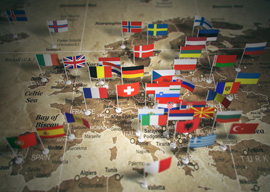
October 06, 2017

Source: Bigstock
The great lie by Leavers before the referendum was that there would be no losers as a result of Brexit.
But here’s a bigger twist to the story: There will be no winners, either.
No one will gain anything from Brexit except for London-based politicians, bureaucrats, book-writing economists, and media people who know an endless story when they see one; but I doubt if the 52 percent were hoping to increase the power of this coterie when they voted yes.
If you don’t believe me about this project of universal losership, ask a Leaver to name someone—not something—who is going to have more rights or happiness after Brexit than before it. They always say it is for the benefit of “the U.K./us/everyone.”
The truth is, no one will gain any rights or opportunities through Brexit; but at least 4 million people will lose out (E.U. citizens in Britain and British citizens in the E.U.).
An idea that promises unproven benefit to a generalized group in some unspecified way, but not to any individual member of that group, is an ideology. That is all Brexit is. It is not the hard-nosed realistic project it claims to be; it is a hope. You only have to count the number of conditionals in any text written by any top economist. In off-guarded moments they even admit that it is all could and would without any certainties, let alone guarantees.
Brexit is an ideology that will not speak its name. Brexiteers think they are anything but ideologists, but they are ideologists in the same school as Marxist-Leninists in wanting to carry out a great social and economic experiment without caring about the individual losers.
The aim of this ideology is not to improve anyone’s life in any concrete way. It is to make the ideologists feel better. They know that they personally will not pay any penalty for their convictions. They are unconcerned about any third party or collateral damage they cause.
If you press a Leaver on what he or she wants, they will admit it is a pyrrhic victory. They want to blow a raspberry at the European Commission. They will tell you they want to build a time machine to go back to 1993, 1973, or 1945—or all at the same time. They know it is impossible to go back in time, but they still want to “return” to what Britain does best: maintain a class system without written rules in contrast to the European notion of rights, equality, cooperation, and sharing. With an ideology you don’t have to be realistic. Which makes it impossible to argue with an ideologist: He can say whatever he wants. Facts and logic have no importance when you feel the right thing to do in your gut.
Their first victory may have been the referendum result, but their biggest success has been to take over ownership of democracy in Britain. No one has been allowed to question anything that has happened since the referendum without being accused of trying to betray the will of the people. Ideologists, you see, do not do dialogue. Why bother talking when they are right?
We must dispel the illusion before we get into a bigger mess. The label of ideologist needs to be stuck on the Brexiteers. Only by exposing the ideology that dare not speak its name can we begin to unravel the absurdities of the past year and a half. The rest follows logically: You cannot hold a democratic vote on an ideology, because it is a vague, emotive yearning, not a practical program; and you cannot implement an ideology for the same reason. Either you get compromise, which the ideologist refers to as betrayal, or you get an unsatisfactory mishmash arrangement that is worse than the status quo.
The only reason this ideology has not so far been exposed as a set of Emperor’s New Clothes is that most people in Britain won’t be affected by Brexit one way or another. They don’t care enough even to ask the question “Who will benefit?” And so Brexit has been allowed to proceed as if it were nothing more than an impersonal macroeconomic and macro-political project.
For all our sakes, we have to admit that we have been duped and call the present government to account for using the ideology to pursue its own ends (to strengthen the executive by weakening parliamentary democracy).
If we continue down this ideological road, the results, ironically, will be less democracy and sovereignty for all and a more confused sense of national identity.